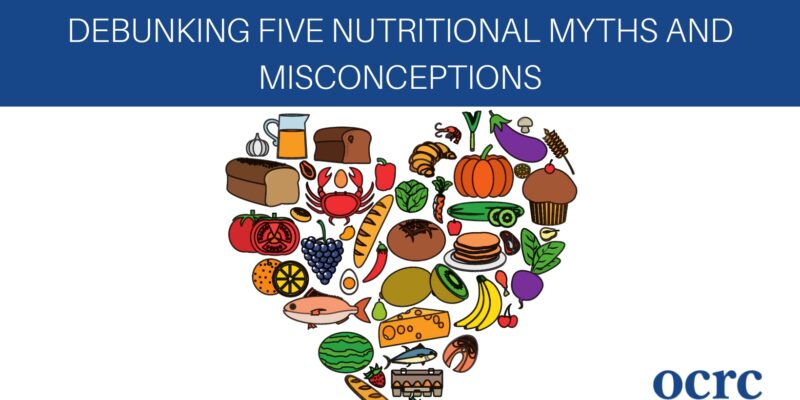
It sometimes seems like nutritional information is constantly changing. Not long ago, health experts suggested limiting egg consumption to two eggs per week. Now, guidelines suggest a healthy person can eat up to seven eggs per week. Science is an ongoing process. New research sometimes proves older information wrong.
Nutritional myths are like that, too. Some nutritional myths are based on information that was once considered factual but is now outdated. Other nutritional myths are ideas that have been widely accepted despite the fact they were never based on evidence. Read on for five nutritional myths that deserve to be debunked to help you make choices that align with fact versus fiction.
Nutritional myths can hold you back from living your healthiest life. These five myths include some of the most common misinformation about meeting your nutritional goals.
The myth that healthy food is difficult to afford stops many people from even trying to improve their diet. It’s true that some healthy foods are more expensive than the budget-stretching foods you may have grown up on, but eating a healthy diet doesn’t have to be expensive if you follow a few simple guidelines:
Also, avoid shopping at “health food” stores. You can find healthy, whole foods at your local market and big box discount stores. It’s not necessary to shop at upscale markets to find items that support your health.
The idea of giving up your favorite sweet treats forever is depressing. A healthy diet can include the occasional cookie, bowl of ice cream, or crispy potato chips. When it comes to treats, balance is key. Depending on your health goals, snacking every day may not be ideal, but having dessert or your favorite savory snack once or twice a week may be alright.
Making treats at home allows you the opportunity to decrease unhealthy ingredients. Switching refined sugar for maple syrup or vegetable oil for coconut oil may not reduce the calories in a cookie, but it does increase the nutritional value.
No amount of celery will burn off the calories from those two extra slices of pizza. There are no magic foods that will rev up your metabolism. Any diet plan that focuses on eliminating entire food groups or consuming only specific foods is likely unsustainable and not healthy in the long run.
Many nutritional myths were born in the 1980s, and the idea that fat is bad for you is one of them. Of course, a person can consume more fat than their body needs, just as they can consume more protein or carbohydrates than they need, but fat is not inherently unhealthy. In fact, your body needs fat to protect your organs, maintain cell membranes, and support brain function.
Many low-fat products are actually more unhealthy than full-fat versions. Removing the fat removes the flavor. Some food manufacturers add more salt, sugar, or chemical flavorings to make fat-free and low-fat products more palatable.
Burning more energy than you consume is the key to sustainable weight loss, but it’s not the only factor. Many other variables affect a person’s weight loss. Certain health conditions, hormone imbalances, genetics, and some medications can make it more difficult to shed unwanted pounds, even with strict calorie control.
At Orlando Clinical Research Center, our commitment to fostering public health extends beyond just conducting clinical studies. We take pride in delivering accurate and well-researched information that empowers individuals to make informed decisions about their health and well-being.
If you would like to actively contribute to the advancement of medical knowledge and potentially be a part of groundbreaking research, visit our current studies to learn more.
